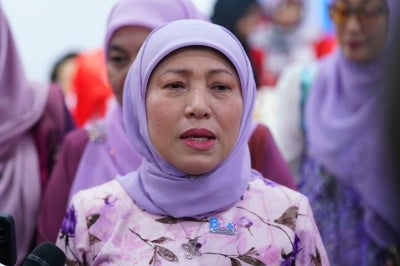Carriers of BRCA1 and BRCA2 genes are 14 times more susceptible to cancer

SHAH ALAM - Individuals carrying the Breast Cancer Gene 1 (BRCA1) and Breast Cancer Gene 2 (BRCA2) are at a heightened risk of cancer, according to experts in the field.
UM Specialist Centre oncoplastic breast surgeon Dr Teoh Li Ying pointed out that those with BRCA1 face a significantly higher risk, up to 14 times greater than the general population.
“Within the general population, the risk of cancer for women without a family history of these mutations is 5 in 100, but for those with BRCA1, it skyrockets to 72 out of 100 individuals,” she said during the Sinar Daily's The Life and Style podcast: Evolving Trends in Breast Surgery and Breast Cancer Treatments out today.
She drew attention to Angelina Jolie, a Hollywood prominent actress, who underwent a preventive mastectomy, removal of her fallopian tubes, and ovaries due to her family's history of BRCA1-related cancer.
"The hype on BRCA1 comes after Angelina Jolie where she actually removed both breast, fallopian tube and ovaries just because she lost her mother and aunt to BRCA1,” she said.
Dr Teoh said when Jolie spoke publicly of her decision, it became “Angelina Jolie Effect” and ultimately influenced many women to get checked.

After the death of Jolie's mother and aunt of breast cancer, she discovered that she too was carrying the BRCA1 gene mutation.
She estimated that this gene gave her an 87 per cent chance of developing breast cancer and a 50 per cent chance of developing ovarian cancer over the course of her lifetime thus in a bid to prevent it, she had preventative bilateral mastectomies and reconstruction in February 2013.
Shifting gears, UM Specialist Centre oncoplastic breast surgeon Associate Professor Dr See Me Hoong emphasised the importance of regular mammograms for women over the age of 50.
She strongly recommended that women in this age group undergo mammograms at least every two years.
Further clarifying, Dr See distinguished between the two genes: BRCA1 primarily affects the breast, ovary, and fallopian tube, while BRCA2 mutations can involve other organs like the pancreas and colon.
Given the wide-reaching impact of these two genes within the body, individuals with these mutations require diligent monitoring and closer scrutiny due to their elevated cancer risk within these specialiSed groups.
"So, frequent surveillance or monitoring and check-ups compared those without the genes are a must as these groups are very specialised group that have higher risk of cancer," she said.
Download Sinar Daily application.Click Here!















